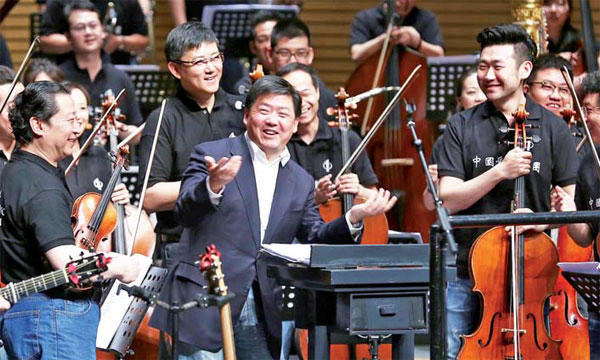Let the music flow on for a little longer
Updated: 2014-05-30 07:41
By Chen Jie (China Daily Europe)
|
|||||||||||
|
Yu Long conducting the anniversary celebration of the China Philharmonic Orchestra. Provided to China Daily |
China philharmonic orchestra has raised the baton for classical music in China
On the evening of May 25 I attended a concert at the Poly Theater in Beijing in a T-shirt and shorts.
I was not the only person dressed so causally. All the musicians were in black T-shirts and jeans. A second violinist was even wearing cowboy boots.
It looked like a birthday party rather than a classical music concert.
Conductor Yu Long and the China Philharmonic Orchestra had fun with their fans and guest artists from the US country music band Buffalo Rome to celebrate the 14th anniversary of the orchestra's founding.
The orchestra played Aaron Copland's Appalachian Spring Suite between Buffalo Rome's songs which included John Denver's Country Road that had the entire hall on their feet, singing along.
When they sang I Swear, I had a flashback of my graduation gala. Three of my classmates sang that song, and my eyes filled with tears. I suddenly realized that I graduated from university and joined China Daily as a music journalist the same summer the CPO was founded.
Memories flooded back.

The first time I interviewed Yu was backstage at the National Library Concert Hall in December 2000. The handsome 36-year-old conductor had just recruited 111 of the best musicians from the country. Most had been poached from the National Symphony Orchestra.
The ambitious conductor was born in a musical family and was trained in Germany. He told me that he had borrowed the hall temporarily, the orchestra would soon have its own residence hall and he planned to build the CPO to be "the best in China, top in Asia and well-known around the world".
I was a green horn both in the newsroom and in the music world. Like most Chinese born in a third-tier city in the late 1970s, I did not grow up with classical music. Familiarizing myself with the music scene was not easy. I would do extensive homework before attending a concert and could not write a story without first checking the music dictionary. I dozed off during an opera gala in my first six months.
On Sept 1, 2001, the CPO started its first season. It was the first time the concept of a "season" was introduced to China.
The same year, the CPO premiered Philip Glass' Cello Concerto. It was the first time a Chinese orchestra commissioned a composer to write music.
In October 2002, Yu conducted the orchestra together with 900 additional musicians to perform Mahler's Eighth Symphony to realize the real "Symphony of A Thousand". I was terrified that someone would fall off the stage but, thank goodness, they made it, nobody fell and the show was a huge success.
On May 7, 2008, I was one of the few Chinese reporters seated in Vatican City's Paul VI Audience Hall to witness the CPO playing for Pope Benedict XVI.
China and the Vatican have no diplomatic ties. When Mozart's Requiem was echoing through the packed hall of 7,000 people, it was a landmark for the CPO as well as China's musical history.
In 2009, one of the world's most influential classical music magazines, Gramophone, listed the CPO among the world's "top 10 most inspiring orchestras".
Yu, now 50, is no longer the young man he was when I first met him all those years ago. But the CPO still doesn't have its own hall. They moved from the National Library and borrowed space from the Beijing Exhibition Center.
More than 30 orchestras have been founded throughout the country in the last decade. And many enjoy more funding from the government than the CPO.
The amount the government will give to an orchestra has little to do with the group's quality or reputation. It has much more to do with how intimate the personal relationship is between the head of the orchestra and a certain official.
A lot of Western classical maestros, from Simon Rattle to Lorin Maazel, say that China is the future of classical music. They've come to this conclusion after learning that millions of children are learning to play the piano or violin, inspired by stars such as Lang Lang and Li Yundi.
They don't know parents send their children to learn instruments only because it gives them extra points when they apply for higher education. They don't know a violinist with the CPO can only earn 5,000 yuan ($800) a month, the starting wage of a white-collar job in Beijing.
They don't know the boom of classical music in China is just a bubble. Regulars to classical music concerts are only a small group in big cities.
But I thank my bosses for giving me this job where I have had the opportunity to go to concerts, enjoy music, talk to maestros from around the world and witness how Chinese orchestras have struggled to develop. I feel lucky to have grown together with the CPO. It has many "firsts" in China's music history and keeps going.
On July 19, the CPO will make its BBC Proms debut, launching this year proms' global orchestra series. It is another first for the group.
Happy birthday CPO, and may we celebrate many more.
The author is the deputy features editor of China Daily. Contact the writer at chenjie@chinadaily.com.cn
(China Daily European Weekly 05/30/2014 page13)
Today's Top News
Brazil installs Chinese security systems for Cup
Spain's king abdicates to revive monarchy
FIFA probe into Qatar 2022 to report
Beijing to ease green card rules
Apps shine at Apple's WWDC
Brazil's goal is more than soccer
Abe, Hagel's accusations rejected
Yuan clearing bank to open in UK
Hot Topics
Lunar probe , China growth forecasts, Emission rules get tougher, China seen through 'colored lens', International board,
Editor's Picks

|

|

|

|

|

|






